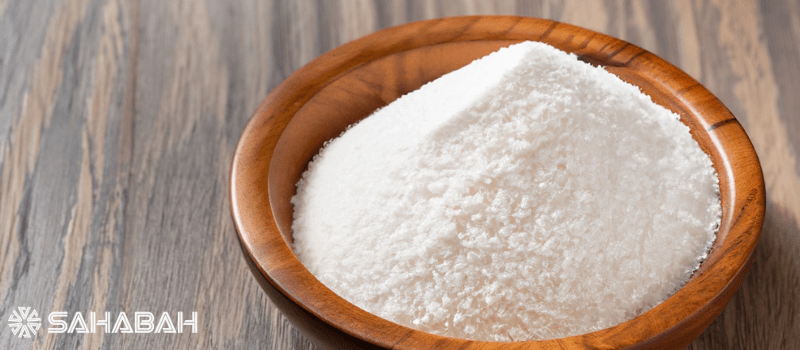Aspartame, also known as E951, is one of the most widely used artificial sweeteners in food and beverages today. But is aspartame halal certified and suitable for consumption by Muslims? This important question deserves a comprehensive look.
In this article, we’ll examine aspartame’s manufacturing process, ingredients, and uses to determine if it’s halal or haraam according to Islamic law. We’ll also look at what different Islamic schools of thought have ruled regarding aspartame’s permissibility and explore the evidence behind their views.
By the end, you’ll have a clear understanding of the halal status of aspartame – one of the world’s most popular halal sweeteners.
What is Aspartame and How is it Made?
Aspartame is an artificial sweetener approximately 200 times sweeter than sugar. It was accidentally discovered in 1965 by a chemist working on an anti-ulcer medication.
Today, aspartame is commonly used as a sugar substitute in over 6000 products worldwide including diet sodas, yogurt, desserts, and tabletop sweeteners like Equal or NutraSweet. It’s especially popular for reducing calories while maintaining sweetness.
But how is aspartame actually produced? The manufacturing process involves combining two amino acids – aspartic acid and phenylalanine.
Amino acids are the building blocks of protein and are halal by themselves. But the combination and chemical alteration that produces aspartame makes its halal status questionable for some Islamic scholars. Let’s analyze further.
Key Ingredients: Aspartic Acid, Phenylalanine, and Methanol
Aspartame contains three main substances:
-
Aspartic acid – An amino acid found naturally in protein-rich foods. Considered halal.
-
Phenylalanine – Another amino acid essential for humans. Also found in protein-rich foods like eggs, fish, and meat. Widely accepted as halal.
-
Methanol – A type of alcohol used in industrial applications. Methanol is the controversial element, though present in tiny amounts, that leads some scholars to prohibit aspartame.
Now let’s look closer at the manufacturing process that combines these components into the final product.
How is Aspartame Made? The Patent Production Process
Aspartame is created by combining phenylalanine and aspartic acid with methanol in a patented manufacturing process developed by G.D. Searle in 1965. Here are the key steps:
-
Phenylalanine and aspartic acid are combined chemically.
-
Methanol is added to form methyl esters.
-
The result is a dipeptide sweetener up to 200 times sweeter than sugar.
Though the amino acids are halal, the reaction process involving methanol is impermissible according to certain Islamic experts. They argue that this chemical alteration of natural aminos produces a new substance that cannot be classified as halal.
However, other scholars disagree and say that the methanol is completely transformed into an allowable compound. Let’s examine these conflicting rulings in more detail.
The Halal Status of Aspartame – Major Opinions
Islamic scholars have varying perspectives on aspartame’s halal acceptability:
1. Completely Halal
Some experts argue aspartame is entirely halal. They state:
-
Aspartic acid and phenylalanine are natural amino acids found in halal foods.
-
Methanol is used in negligible amounts and chemically altered.
-
Aspartame does not intoxicate or harm health in permitted amounts.
-
No pork or other haram ingredients are used.
-
Aspartame has received halal certification from recognized bodies.
2. Avoid as Precaution
Other scholars say avoiding aspartame is better to be cautious. Their reasons include:
-
Aspartame involves chemical processing of aminos into a new synthetic substance.
-
Traces of methanol may remain in the end product.
-
Possible health risks if consumed in large amounts.
3. Prohibited
Some strict scholars prohibit aspartame outright based on these factors:
-
Methanol is considered an impure alcohol that makes aspartame haram.
-
Chemical alteration of natural amino acids is impermissible.
-
Too risky for health with controversial side effects.
-
No approval from trustworthy halal certification organizations.
With these major opinions in mind, let’s now turn to reviewing the evidence on aspartame’s health effects and halal certification status.
Does Aspartame Pose Health Risks? The Evidence
One key consideration in determining food permissibility in Islam is whether it causes harm. Aspartame has been a controversial artificial sweetener since its approval. Does the evidence show negative health effects?
-
Aspartame is one of the most rigorously tested food additives with over 200 studies confirming its safety in typical consumption amounts. However, a few studies have sparked concerns.
-
In the Digest according to the Hanafi madhab, Ibn Abidin states “A substance that is originally permissible to consume, but is proven to be harmful or poisonous to humans, becomes prohibited.”
-
A 2012 study linked aspartame to increased risk of blood cancers like leukemia, lymphoma, and myeloma in men. However, this study had limitations and has not been replicated. Overall, FDA and EFSA scientists conclude aspartame does not cause cancer.
-
Some research indicates aspartame may worsen symptoms for those with mood or neurological disorders. But evidence is not definitive.
-
Those with the rare genetic disorder phenylketonuria (PKU) must control phenylalanine intake from all sources, including aspartame. Products containing aspartame carry warning labels for PKU sufferers.
While inconclusive, some health concerns may warrant an avoidance of aspartame for some Muslims. But the evidence is not clear-cut, and aspartame remains authorized as safe by global health authorities.
Who Certifies Aspartame as Halal? Major Organizations
To settle the halal status controversy over aspartame for Muslim consumers, various organizations have researched its manufacturing process and now certify it as halal:
-
JAKIM – Malaysia’s Department of Islamic Development certifies aspartame as halal, meaning permissible under Islamic law. JAKIM approves its production process, ingredients, and amounts of methanol used.
-
HALAL – Aspartame is halal certified by the Islamic Food and Nutrition Council of America (IFANCA). IFANCA’s globally recognized halal symbol appears on products containing aspartame.
-
UIDA – The UAE’s International Halal Accreditation Forum accepts aspartame as halal after reviewing manufacturing methods. UIDA certification means any product with aspartame can be deemed halal.
-
GCC Standardization Organization (GSO) – The halal standards authority for the Gulf nations has certified aspartame as permissible for Muslims.
These endorsements from renowned Islamic bodies provide assurance of aspartame’s acceptability for Muslim consumers looking to avoid any haram ingredients.
Which Food and Beverage Products Contain Aspartame?
Now that we’ve analyzed its production and certification, where exactly is aspartame found? Aspartame is a popular choice for food and beverage manufacturers wanting to reduce sugar and calories in their products. Typical products containing aspartame include:
-
Diet or zero-calorie sodas and soft drinks
-
Sugar-free chewing gum and mints
-
Low-calorie yogurts or desserts
-
Tabletop sweeteners (Equal, NutraSweet, etc.)
-
Vitamin waters and flavored waters
-
Sugar-free medicine syrups
-
Low-sugar protein or nutrition bars
-
Sugar-free gelatins and puddings
Always check the label when purchasing processed foods and drinks to look for aspartame or other sweeteners among the ingredients. This allows you to avoid any questionable additives if desired.
Is Aspartame Halal – FAQ
Aspartame is a widely used artificial sweetener that is found in many food and beverage products. It is often used as a sugar substitute because it is low in calories and sweeter than sugar. However, when it comes to determining whether aspartame is halal or not, there are a few considerations to keep in mind.
What is aspartame?
Aspartame, also known as E951, is an artificial sweetener that is used in a variety of food and beverage products. It is made up of two amino acids, aspartic acid and phenylalanine, and is commonly found in sugar-free and low-calorie products.
Does aspartame have halal certification?
Aspartame itself does not have a halal certification. However, there are some manufacturers who produce halal certified aspartame. It is important to check the product label or contact the manufacturer to determine if the aspartame used in a specific product is halal certified.
Is aspartame halal or haram?
The status of aspartame being halal or haram depends on its source and the manufacturing process. If aspartame is derived from a halal source and the manufacturing process does not involve any haram ingredients or processes, then it can be considered halal. However, if the source or the manufacturing process involves haram ingredients or processes, then aspartame would be considered haram.
Is aspartame an artificial sweetener?
Yes, aspartame is classified as an artificial sweetener. It is chemically synthesized and used as a sugar substitute in various food and beverage products.
Does aspartame contain any alcohol?
Aspartame does not contain any alcohol. It is a non-alcoholic sweetener that is made from amino acids.
Is aspartame an ingredient in all food and beverage products?
Aspartame is commonly used as an ingredient in sugar-free and low-calorie food and beverage products. However, it may not be present in all products. It is important to check the product label to determine if aspartame is included as an ingredient.
What is the role of aspartame in the manufacturing process of food and beverage products?
Aspartame is used in the manufacturing process of food and beverage products as a sweet
Conclusion
In summary, here are the key takeaways on whether aspartame (E951) is considered halal:
-
Aspartame is a popular artificial sweetener up to 200x sweeter than sugar, commonly used in processed foods and diet beverages.
-
It is produced by combining two amino acids (phenylalanine and aspartic acid) with methanol via a chemical process.
-
There is disagreement among Islamic scholars regarding whether aspartame is halal or haram.
-
Some pronounce it completely permissible, while stricter groups prohibit it due to the methanol or chemical alteration. Others say avoiding it is better to be cautious.
-
Evidence on harmful health effects is inconclusive. While some studies sparked concern, global health authorities continue to affirm aspartame as safe in typical consumption amounts.
-
Leading halal certification bodies like JAKIM, IFANCA and UIDA have authorized aspartame as halal after extensive review.
-
Products containing aspartame include diet sodas, low-calorie yogurts, sugar-free gum and many others. Always check labels to identify.
-
Muslims comfortable with aspartame’s halal status can safely consume products containing it to reduce sugar and calories. But those wanting to abstain have basis to avoid aspartame as a precaution.
This concludes our in-depth look at the halal status of aspartame. We’ve examined manufacturing methods, health effects, certification, and products containing this popular artificial sweetener. With the information presented, Muslim consumers can now make an informed decision on whether aspartame (E951) meets their personal religious dietary standards.





